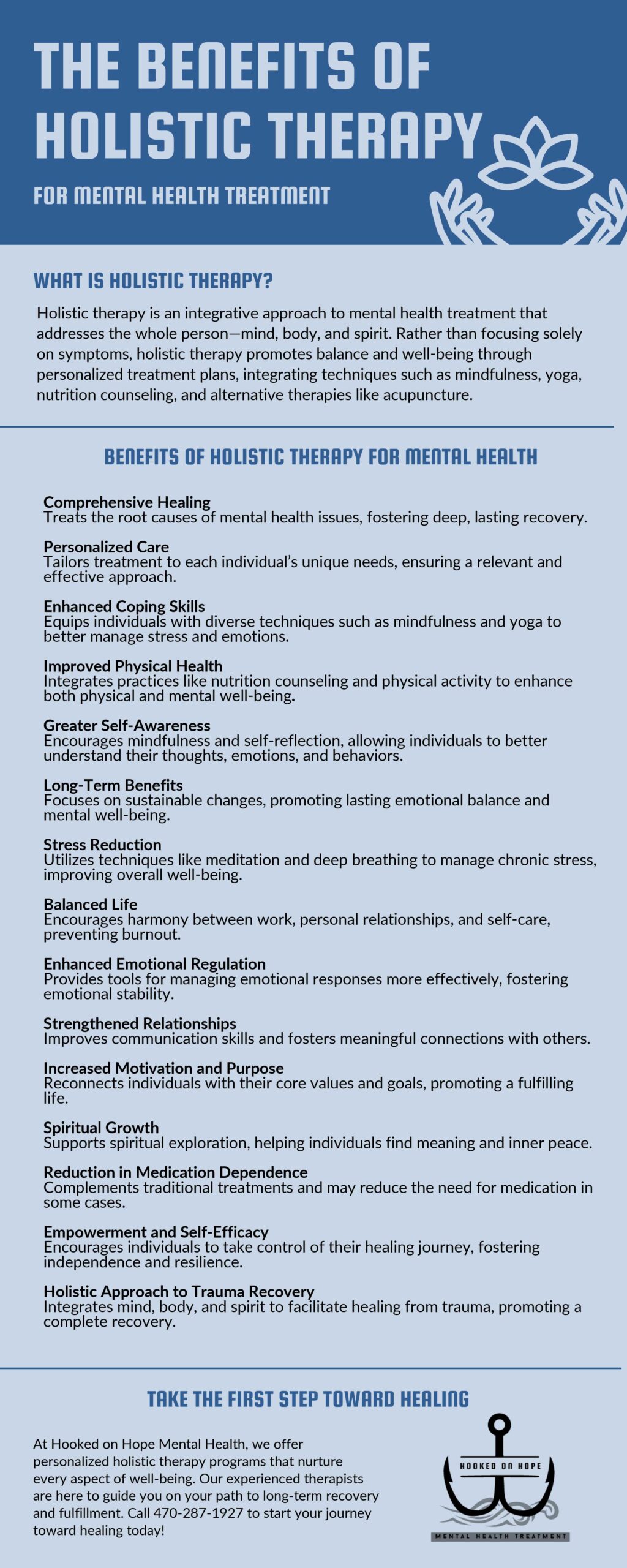Mental health challenges can feel overwhelming, but there are numerous paths to healing and recovery. One such path gaining recognition is holistic therapy. At Hooked on Hope Mental Health, we embrace holistic therapy as a cornerstone of our mental health treatment programs in Atlanta. This approach not only addresses the symptoms of mental health disorders but also nurtures the whole person—mind, body, and spirit. In this blog, we will explore the benefits of holistic therapy for mental health treatment and why it might be the right choice for you or your loved ones.
What is Holistic Therapy?
Holistic therapy is an integrative approach to mental health treatment that considers the entire person rather than just their symptoms. Unlike traditional therapies that may focus solely on psychological aspects, holistic therapy incorporates multiple dimensions of well-being, including physical, emotional, mental, and spiritual health. This comprehensive approach aims to create balance and harmony within an individual, promoting overall wellness and resilience.
At Hooked on Hope Mental Health, our holistic therapy programs in Atlanta are designed to address the unique needs of each individual. We believe that true healing occurs when all aspects of a person’s life are nurtured and supported. By combining various therapeutic techniques, we help clients achieve lasting mental health and personal growth.
Understanding the Core Principles of Holistic Therapy
Holistic therapy is founded on several core principles that differentiate it from other forms of mental health treatment:
- Whole-Person Focus: Holistic therapy treats the entire individual, addressing physical, emotional, mental, and spiritual aspects to ensure comprehensive well-being.
- Individualized Treatment: Each treatment plan is tailored to fit the unique needs, strengths, and challenges of the individual, ensuring personalized care.
- Integrative Techniques: Combines various therapeutic modalities such as cognitive-behavioral therapy (CBT), mindfulness, yoga, nutrition counseling, and alternative therapies like acupuncture or massage to enhance treatment effectiveness.
- Preventive Care: Emphasizes not only treating existing mental health issues but also promoting healthy lifestyle choices and stress management to prevent future problems.
- Empowerment and Self-Discovery: Encourages individuals to take an active role in their healing process, fostering self-awareness, personal responsibility, and empowerment for long-term recovery.

15 Benefits of Holistic Therapy for Mental Health
Holistic therapy offers a wide array of benefits for individuals seeking mental health treatment. By addressing the whole person—mind, body, and spirit—holistic therapy provides a comprehensive approach that fosters deep and lasting healing. Here are some of the key benefits of incorporating holistic therapy into your mental health treatment plan:
1. Comprehensive Healing
Holistic therapy goes beyond merely alleviating symptoms; it seeks to understand and heal the root causes of mental health issues. By considering all aspects of an individual’s life, including physical health, emotional well-being, mental state, and spiritual beliefs, holistic therapy ensures a thorough and lasting healing process. This integrated approach can lead to more profound and sustained improvements compared to traditional therapies that may focus solely on specific symptoms.
For example, someone struggling with anxiety might benefit not only from talk therapy but also from practices like yoga or meditation that help regulate the nervous system and promote relaxation. By addressing both the psychological and physiological components of anxiety, holistic therapy facilitates a more complete recovery.
2. Personalized Care
Every individual is unique, with distinct experiences, strengths, and challenges. Holistic therapy acknowledges this individuality by tailoring treatment plans to meet the specific needs of each person. This personalized approach ensures that therapy is relevant and effective, addressing the unique factors contributing to an individual’s mental health struggles.
At Hooked on Hope Mental Health, our therapists take the time to understand your personal history, lifestyle, and goals. This allows us to create a customized treatment plan that leverages your strengths and addresses your specific challenges, fostering a more effective and meaningful healing journey.
3. Enhanced Coping Skills
One of the primary goals of holistic therapy is to equip individuals with a diverse set of coping strategies to manage stress, anxiety, depression, and other mental health issues. Techniques such as mindfulness, meditation, yoga, and deep-breathing exercises are integral parts of holistic therapy that help individuals develop resilience and improve emotional regulation.
By learning and practicing these skills, individuals can better handle life’s challenges without resorting to unhealthy coping mechanisms. For instance, mindfulness practices can help reduce rumination and increase present-moment awareness, making it easier to navigate difficult emotions and situations.
4. Improved Physical Health
Mental and physical health are deeply interconnected. Holistic therapy often includes components that promote physical well-being, such as nutrition counseling, exercise routines, and alternative therapies like acupuncture or massage. Improving physical health can have a positive impact on mental health, creating a synergistic effect that enhances overall well-being.
For example, regular physical activity can boost mood and reduce symptoms of depression and anxiety by releasing endorphins and improving sleep quality. Additionally, proper nutrition supports brain health, which is crucial for maintaining mental stability and cognitive function.
5. Greater Self-Awareness
Holistic therapy fosters increased self-awareness through practices like mindfulness, self-reflection, and journaling. Greater self-awareness allows individuals to better understand their thoughts, emotions, and behaviors, leading to improved self-regulation and personal growth.
With enhanced self-awareness, individuals can identify negative patterns, recognize triggers, and make informed decisions that align with their values and goals. This deeper understanding of oneself is essential for achieving lasting mental health and personal fulfillment.
6. Long-Term Benefits
Unlike some traditional therapies that may provide temporary relief, holistic therapy focuses on creating sustainable, long-term changes. By addressing the underlying causes of mental health issues and promoting healthy lifestyle choices, holistic therapy helps individuals maintain their progress and continue to thrive even after therapy has concluded.
Long-term benefits of holistic therapy include sustained emotional balance, improved relationships, and a greater sense of purpose and fulfillment. These enduring changes contribute to overall life satisfaction and resilience against future mental health challenges.
7. Stress Reduction
Chronic stress is a common factor in many mental health disorders. Holistic therapy employs various stress-reduction techniques such as meditation, yoga, and deep-breathing exercises to help individuals manage and reduce their stress levels effectively. These practices not only alleviate immediate stress but also build long-term resilience, making it easier to handle future stressors.
Reducing stress through holistic therapy can lead to improved mental clarity, better emotional regulation, and enhanced physical health, all of which contribute to overall well-being.
8. Balanced Life
Holistic therapy encourages individuals to achieve balance in all areas of their lives, including work, personal relationships, and self-care. By promoting harmony between different aspects of life, holistic therapy helps prevent burnout and fosters a more fulfilling and well-rounded existence.
Achieving balance allows individuals to prioritize their well-being, set healthy boundaries, and engage in activities that bring joy and satisfaction. This balanced approach supports sustained mental health and a higher quality of life.
9. Enhanced Emotional Regulation
Holistic therapy provides tools and techniques to help individuals better understand and manage their emotions. Practices such as mindfulness and cognitive-behavioral strategies enable individuals to respond to emotional triggers in healthier ways, reducing the likelihood of emotional overwhelm or impulsive reactions.
Improved emotional regulation leads to more stable moods, reduced anxiety, and a greater capacity to handle life’s ups and downs with grace and resilience.
10. Strengthened Relationships
Healthy relationships are a cornerstone of mental well-being. Holistic therapy often includes components that focus on improving communication skills, building empathy, and fostering meaningful connections with others. By enhancing interpersonal skills, individuals can develop stronger, more supportive relationships that contribute to their overall mental health.
Strong, positive relationships provide emotional support, reduce feelings of isolation, and create a sense of belonging, all of which are vital for maintaining mental health.
11. Increased Motivation and Purpose
Holistic therapy helps individuals reconnect with their core values and passions, fostering a sense of purpose and motivation. By aligning actions with personal values, individuals are more likely to engage in activities that are meaningful and fulfilling, enhancing their overall sense of purpose in life.
A strong sense of purpose can drive individuals to pursue their goals with determination and resilience, supporting sustained mental health and personal growth.
12. Spiritual Growth
For many, spirituality plays a significant role in mental health and overall well-being. Holistic therapy respects and integrates an individual’s spiritual beliefs and practices, providing a framework for spiritual growth and exploration. This integration can lead to a deeper sense of meaning, connection, and inner peace.
Spiritual growth through holistic therapy can enhance one’s ability to cope with life’s challenges, fostering a sense of hope and resilience.
13. Reduction in Medication Dependence
While not a substitute for medical treatment, holistic therapy can complement traditional approaches and potentially reduce the need for medication in some cases. By addressing multiple facets of well-being and promoting natural healing processes, holistic therapy can enhance the effectiveness of other treatments and contribute to overall mental health without solely relying on pharmaceuticals.
14. Empowerment and Self-Efficacy
Holistic therapy empowers individuals by giving them the tools and confidence to take control of their own healing journey. This sense of empowerment and increased self-efficacy enables individuals to make positive changes in their lives, fostering independence and self-reliance.
Empowered individuals are more likely to engage actively in their treatment, set and achieve personal goals, and maintain their mental health beyond the therapy sessions.
15. Holistic Approach to Trauma Recovery
For those who have experienced trauma, holistic therapy offers a compassionate and comprehensive approach to healing. By addressing the physical, emotional, and spiritual impacts of trauma, holistic therapy facilitates a more complete recovery process. Techniques such as trauma-informed yoga, somatic experiencing, and mindfulness can help individuals process and release trauma, promoting healing and resilience.
Integrating Holistic Therapy into Daily Life
One of the strengths of holistic therapy is its emphasis on integrating therapeutic practices into everyday life. This ensures that the benefits of therapy extend beyond the treatment sessions and become part of an individual’s daily routine.
Here are some ways to incorporate holistic therapy into your daily life:
- Mindfulness Practices – Incorporate mindfulness techniques such as meditation, deep breathing, or mindful walking into your daily routine. These practices can help you stay present, reduce stress, and enhance emotional regulation.
- Physical Activity – Engage in regular physical activities like yoga, tai chi, or simple stretching exercises. Physical movement not only improves physical health but also boosts mood and reduces anxiety.
- Healthy Nutrition – Maintain a balanced diet rich in nutrients that support brain health, such as omega-3 fatty acids, vitamins, and minerals. Proper nutrition can significantly impact your mental well-being.
- Adequate Sleep – Prioritize getting enough sleep each night. Good sleep hygiene is essential for mental health, as it helps regulate mood, improve cognitive function, and reduce stress.
- Social Connections – Foster strong, supportive relationships with friends, family, and community members. Social connections provide emotional support and a sense of belonging, which are crucial for mental health.
- Creative Expression – Engage in creative activities like painting, writing, or playing music. Creative expression can be a powerful outlet for emotions and a way to explore your inner self.
- Nature Exposure – Spend time in nature to enhance your mental well-being. Nature has a calming effect and can help reduce feelings of anxiety and depression.
- Self-Care Routine – Develop a self-care routine that includes activities you enjoy and that promote relaxation and well-being. Self-care is essential for maintaining mental health and preventing burnout.
Why Choose Holistic Therapy in Atlanta?
Choosing holistic therapy in Atlanta means accessing a wealth of resources and support within a vibrant and diverse community. Atlanta is home to a variety of holistic health practitioners, wellness centers, and support groups that complement the services provided by Hooked on Hope Mental Health. By choosing holistic therapy in Atlanta, you benefit from:
- Access to Diverse Therapies: Atlanta offers a wide range of holistic therapies, from traditional practices like yoga and meditation to alternative treatments such as acupuncture and massage therapy. This diversity allows you to find the therapies that best suit your needs and preferences.
- Community Support: Atlanta’s strong community networks provide additional support through local wellness groups, fitness centers, and cultural organizations. These communities can enhance your holistic therapy experience by offering opportunities for connection and mutual support.
- Convenient Location: Located in the heart of Atlanta, Hooked on Hope Mental Health is easily accessible, making it convenient for individuals in the city and surrounding areas to receive holistic therapy. Our central location ensures that you can incorporate therapy into your daily routine without added stress.
- Vibrant Wellness Culture: Atlanta has a thriving wellness culture that emphasizes the importance of mental, physical, and spiritual health. This supportive environment fosters a positive atmosphere for your healing journey, encouraging you to embrace holistic practices and integrate them into your life.
By choosing holistic therapy in Atlanta with Hooked on Hope Mental Health, you are selecting a treatment approach that is comprehensive, personalized, and deeply supportive. Our commitment to holistic care ensures that you receive the best possible support as you work toward achieving mental health and overall well-being.
Holistic Therapy at Hooked on Hope Mental Health
At Hooked on Hope Mental Health, our holistic therapy programs in Atlanta are meticulously designed to nurture every aspect of your being. We begin with a thorough initial assessment to understand your mental health history, current challenges, and personal goals. This comprehensive evaluation allows us to develop a personalized treatment plan that integrates evidence-based therapeutic techniques with alternative therapies such as mindfulness meditation, yoga, and nutrition counseling. Our experienced therapists are dedicated to providing continuous support and guidance, ensuring that your treatment evolves with your progress and needs.
We believe that lasting mental health and well-being come from a balanced approach that addresses the mind, body, and spirit. Our supportive environment fosters a sense of community and belonging, helping you build strong, healthy relationships while promoting self-discovery and personal growth. By choosing holistic therapy at Hooked on Hope Mental Health, you are committing to a journey of healing that empowers you to achieve long-term resilience and fulfillment. Located in Atlanta, we are dedicated to making holistic therapy accessible and effective for you and your loved ones, providing the tools and support necessary for a healthier, happier life. Contact Hooked on Hope Mental Health at 470-287-1927 or fill out our online contact form to take the first step toward healing through our comprehensive outpatient holistic treatment in Atlanta, GA.






